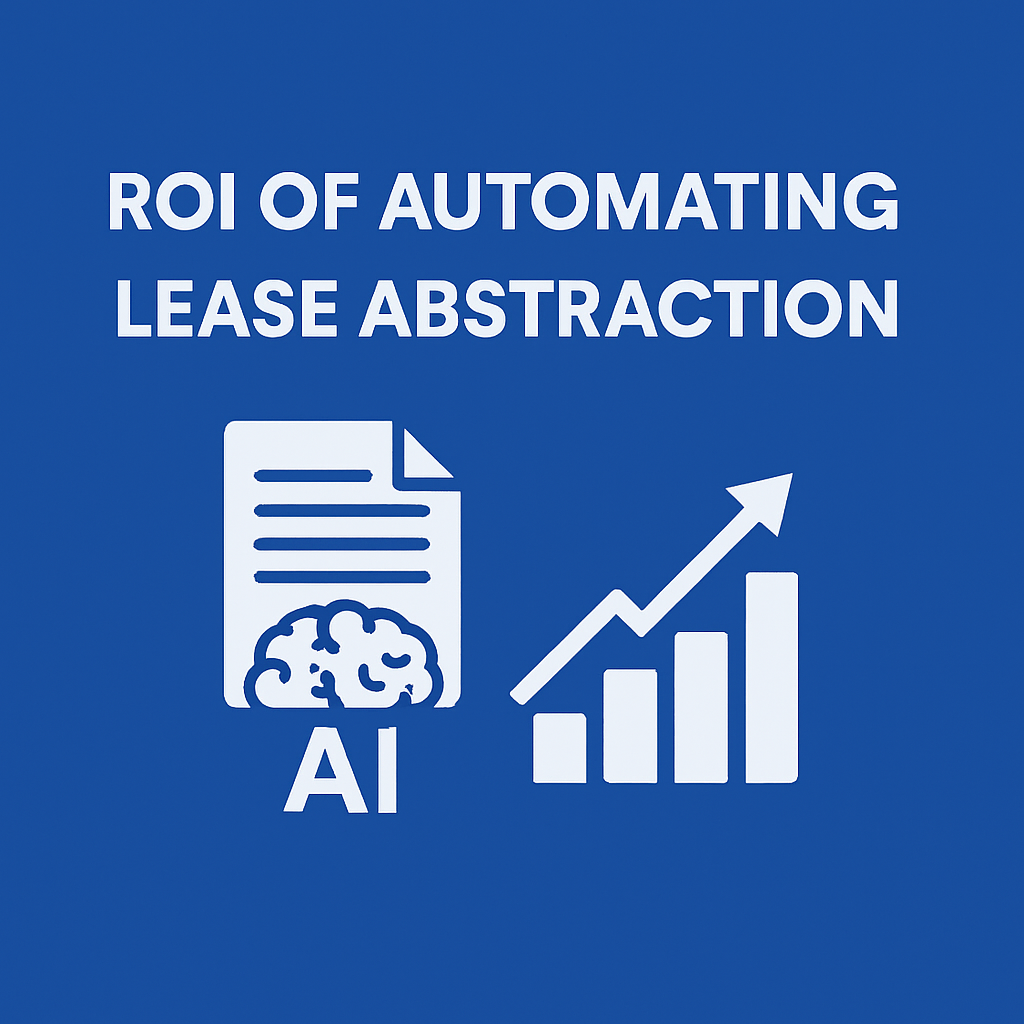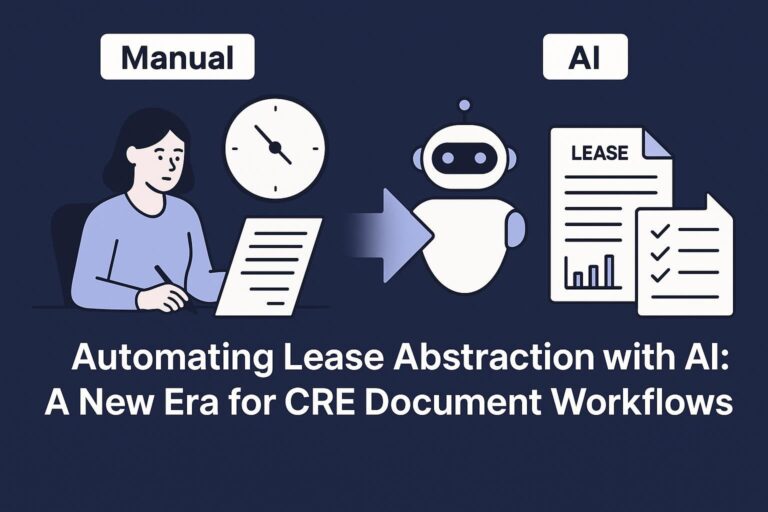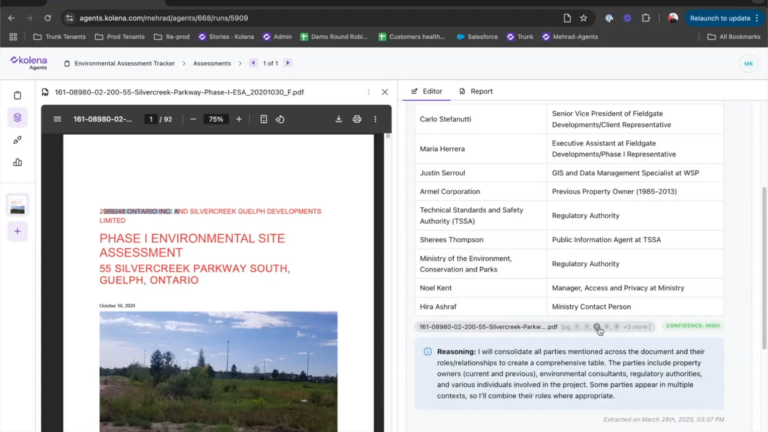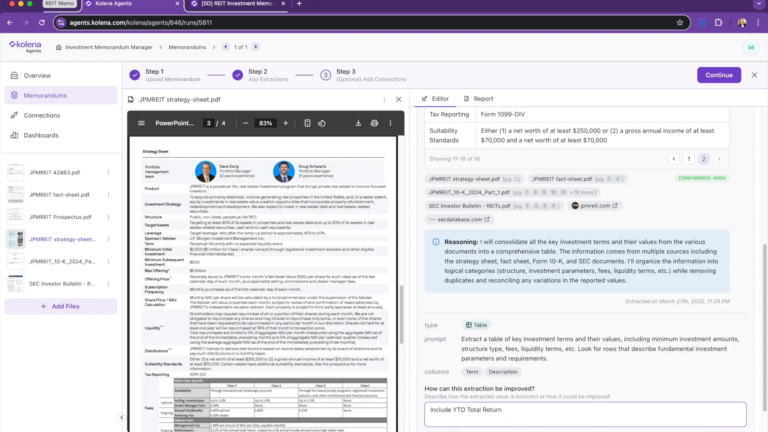
In commercial real estate, time is money — and nowhere is that more obvious than in the labor-intensive process of lease abstraction. Traditionally, teams have spent hours manually reviewing and summarizing leases, leading to high costs, slow deal cycles, and frequent errors. Today, AI-powered lease abstraction is changing the game. By dramatically cutting down the time, cost, and risk involved in extracting critical lease insights, automation offers CRE firms a clear and compelling return on investment. In this article, we break down the real-world numbers to show just how much value AI can create for real estate owners, operators, and investment managers.
Key Research Findings
- Labor Cost of Lease Management Roles: Lease administrators and analysts in U.S. commercial real estate (CRE) firms earn roughly $25–$30 per hour on average (about $50k–$60k per year)zippia.com. More senior roles like asset managers average around $40+ per hour (approximately $85k/year) zippia.com. These salaries represent the baseline cost for manual lease abstraction work.
- Time to Manually Abstract a Lease: Manually reading and abstracting a commercial lease is a labor-intensive process taking on the order of 3–5 hours per lease on average rsmus.com. Complex or lengthy leases (often 20–50 pages) can require 4–8 hours of work each ascendixtech.com. In practice, many CRE teams report spending essentially half a day per lease to extract all key terms and data points. This means one full-time staff member might only process a couple of leases per day at most.
- Time with AI-Powered Abstraction: AI lease abstraction tools can cut this process down drastically. Machine learning models (using OCR and NLP) can extract lease terms in minutes, leaving only a review/edit step for a human. Overall time per lease drops by 70–90% with AI assistance. For example, one platform reports reducing lease processing from ~3 hours to just 7 minutes per document in tests. Even allowing time for verification, teams using AI can review a lease in well under an hour instead of several hours.
- Lease Volume per Team: A typical mid-sized CRE portfolio entails hundreds of leases that need managing. A CRE firm with ~1,000 leases might spend around 1,200 person-hours on abstraction if done fully manual (roughly 60% of one FTE’s annual capacity) rsmus.com. Many organizations face “lease abstraction backlogs” of hundreds or thousands of leases during portfolio audits or system migrations. In day-to-day operations, a lease administrator might handle dozens of new or renewing leases per month, which quickly adds up in labor hours under manual processes.
AI Case Studies – Time & Cost Savings
Real-world benchmarks show significant ROI from automating lease abstraction:
- Time Savings: MRI Software (Leverton) noted one client cut 90% of the time spent abstracting and validating lease data mricontractintelligence.com. PropTech startups likewise claim up to 90% reduction in lease review processing time. Even more conservative estimates cite at least 70% faster lease processing with AI on average.
- Cost Reduction: By speeding up work and reducing labor needs, AI can slash costs. One CRE firm reported 50% lower abstraction costs after adopting an AI-driven contract intelligence tool, along with saving 7–10 business days in due diligence time on acquisitions. Emerging AI solutions advertise 90% cost savings versus traditional manual review, especially if leases were previously abstracted by expensive external attorneys or consultants.
- Accuracy Improvements: Automated extraction tools consistently achieve 90–95%+ accuracy in identifying key lease clauses and data. This is on par with or better than human abstractors, dramatically reducing the risk of missed options, incorrect charges, or other costly errors. Fewer mistakes mean fewer revenue leakage issues – for instance, studies have found manual errors can lead to substantial rent mischarges over time, so improving accuracy has direct financial benefits.
- Productivity & Strategic Value: JLL estimates that generative AI and automation could free up roughly 20% of an asset or portfolio manager’s time us.jll.com by taking over tasks like lease abstraction. This allows highly paid professionals to redirect hours to higher-value activities (finding new deals, improving tenant relationships, etc.), which can ultimately boost revenue (~0.5% in JLL’s projection) us.jll.com. Faster lease abstraction also accelerates deal timelines – several companies note that AI-enabled processes shave about 1–2 weeks off the time required for lease due diligence during acquisitions, letting deals close sooner.
Schedule a personalized demo with Kolena’s AI Enablement expert.
ROI Summary: Time & Cost Benefits of Automating Lease Abstraction
Implementing AI for lease abstraction delivers a compelling return on investment for CRE firms by drastically reducing labor hours, cutting costs, and speeding up workflows. Consider that a typical commercial lease can take 4–8 hours for staff to manually read through and summarize ascendixtech.com. At an average labor cost of ~$30/hour for a lease administrator zippia.com, that’s roughly $120–$240 in labor spent per lease.
With modern AI tools, that same lease might be processed in a fraction of the time – often under an hour when the AI does the heavy lifting and an analyst simply reviews the output. This means each lease could cost only ~$30–$60 of staff time, saving about 3–7 hours of work per document. In practice, firms are seeing 70–90% time savings on lease abstraction tasks mricontractintelligence.com. For a portfolio that requires abstraction of 100 leases a year, this efficiency translates to 300–500 hours saved annually. At $25–$30/hour, that’s roughly $7,500–$15,000 in labor cost avoided per year for that modest portfolio. Larger firms handling 1,000+ leases can save on the order of 1,000+ hours, equal to tens of thousands of dollars in wage costs – effectively eliminating the need for about half a full-time employee for this function.
These savings go straight to the bottom line. In one case, a CRE company cut its ongoing lease abstraction expenses by about 50% after adopting an AI-based solution, while also shaving 7–10 business days off its deal review timelines. Another AI platform’s clients report spending only 10% of the time and budget they used to on lease reviews – a ninety percent reduction in workload and costs. Such improvements yield a rapid payback on technology investment. Even factoring in software subscription fees, the productivity boost means the AI tool often pays for itself within the first year through labor hours saved.
Beyond direct cost savings, automated lease abstraction creates value through speed and accuracy. What used to take a lease analyst half a day can now be turned around in minutes, which accelerates deal underwriting and portfolio analysis. Faster access to lease insights can expedite acquisitions, leasing decisions, and rent recovery. For example, firms have reported closing deals faster by about 1–2 weeks thanks to quicker lease due diligence, which can be crucial in competitive transactions. Moreover, AI’s consistency reduces human error – with many tools exceeding 90–95% accuracy, CRE teams can trust that key financial or legal details won’t be overlooked. This improvement in data quality helps avoid revenue leakage (such as missed escalation clauses or incorrect billing) and ensures better decision-making based on complete information.
In summary, the ROI of automating lease abstraction is significant. By freeing up hundreds of staff hours, a mid-sized real estate operator might save five to six figures in annual personnel costs while redeploying their team to more strategic work. The combination of hard dollar savings, faster deal cycles, and reduced risk through improved accuracy makes AI-powered lease abstraction a high-impact investment for CRE firms. Industry leaders like JLL even project that embracing AI for these tasks can free ~20% of asset managers’ time for higher-value activities us.jll.com, ultimately driving better portfolio performance and growth. For owners, operators, and REITs looking to do more with less, automating the lease abstraction process delivers tangible value – in time saved, in dollars saved, and in smarter, faster decision-making powered by instant access to lease insights.
Schedule a personalized demo with Kolena’s AI Enablement expert.



